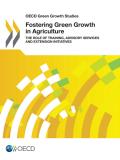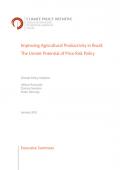The overriding challenge for many European governments today is to reduce major fiscal deficits with the least collateral damage to the economy. This report shows that carbon fiscal measures may raise significant revenues while having a less detrimental macro-economic impact than other tax options. This gives them an important potential role in fiscal policy; a role that is currently widely overlooked. This benefit arising from carbon fiscal measures goes beyond the usual arguments in their favour – namely that they are crucial, cost effective instruments to reduce Europe’s greenhouse gas emissions. The main focus of this report has been on the immediate opportunities for carbon pricing to assist with deficit reduction. In addition to this, the report explores whether there may also be longer term opportunities to raise greater revenue from carbon pricing while improving the efficiency and effectiveness of the EU ETS.

Knowledge investment supporting the adoption of environmentally friendly farm practices is a key driver behind innovation processes in agriculture, yet impact evaluations and financial assessments of existing initiatives remain scarce despite dramatic changes in orientation, organisation and intervention. This report examines the role, performance and impact of farm advisory services, training and extension initiatives in the OECD area to foster green growth in agriculture. Based on a series of case studies, the report discusses a range of methodological issues and the merits of the different types of providers, and identifies best practices in sustainable agricultural management.
The science is unequivocal: stabilizing climate change implies bringing net carbon emissions to zero by 2100 if we are to keep climate change anywhere near the 2°C warming that world leaders have agreed on as the limit. Decarbonizing Development: Three Steps to a Zero-Carbon Future looks at what it would take to decarbonize the world economy by 2100 in a way that is compatible with countries’ broader development goals. The book argues that all countries must:
(i) Plan ahead with an eye on the end-goal so as to enact the right policy mix that will allow them to take advantage of options that offer immediate local co-benefits while taking actions that will allow them to reach the long term objective and avoid locking in carbon-intensive patterns and higher future expense.
The Government of India has ambitious renewable energy targets, but limited financial resources to meet those targets. CPI examines how much it would cost the government to reach its renewable energy targets, by comparing the levelized cost of electricity from renewable energy to a baseline fossil fuel in absence of any subsidies – whether explicit or implicit; estimating the total cost of support for renewable energy under accelerated depreciation to determine which is the most cost-effective of existing policies; and investigating federal policy options to make this support even more cost-effective. The paper is organized in five sections. After the first section of introduction, section 2 discusses the selection of imported coal as the baseline cost of electricity for comparison with renewable energy. Section 3 forecasts and compares the levelized cost of electricity from renewable energy and the baseline of imported coal. Section 4 examines the cost of government support for renewable energy under different policy pathways. Section 5 presents policy implications.

